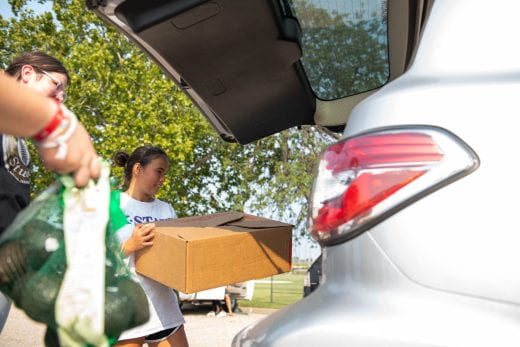 Looking for an adventure of service, learning, and new friendships? Join a Service Team!
Looking for an adventure of service, learning, and new friendships? Join a Service Team!
Kansas State University students are invited to join the Staley School of Leadership Service Teams on an Alternative Break to La Harpe, Kansas, for a community clean-up.
You can sign up as an individual or encourage your student group members or friends to attend with you! The team will depart from the K-State campus 2 p.m. Friday, Nov. 15, and return to campus around 6 p.m. Saturday, Nov. 16. Applications are due Monday, Nov. 11.
Students can be undergraduate or graduate, domestic or international, and from any major area of study. The cost to attend is $10. Participants and site leaders will receive training before the trip. Learn more and register.
Why Service Teams?
- Make progress within communities.
- Build relationships with Wildcats – which is great for your well-being.
- Explore the Midwest.
- Grow personally and professionally.
- Learn through service.

“Year after year, students who participate in a Service Teams experience come back and tell us just how valuable this work was for their growth, and how it can change their perspective and even open their eyes to a new career path they are passionate about,” said Tamara Bauer Ed.D., director of leadership and service programs and assistant teaching professor at the Staley School.
Students will participate in the Active Citizen Summit to prep for the Alternative Break and connect with fellow volunteers on these dates:
- Pre-Experience Summit: 6-8 p.m. Monday, Nov. 11
- Post-Experience Summit (Reflection): 6-7 p.m. Monday, Nov. 18
More Upcoming Alternative Breaks
Winter Break: Jan. 12-15 | Request more information
- Kansas City, Missouri
- Garden City, Kansas
- Springfield, Missouri
Spring Break: March 15-19 | Request more information
- Tahlequah, Oklahoma
- Dallas, Texas
For more information about the Staley School Service Teams, visit www.k-state.edu/serviceteams or email leadership@ksu.edu.
The Staley School of Leadership at Kansas State University includes undergraduate and graduate leadership studies academic programs, leadership and service co-curricular programs, the University Honors Program, and Scholar Development and Undergraduate Research. The Staley School equips learners with leadership skills and academic excellence through applied learning experiences, in-class learning, and community partnerships around the world. To learn more, visit www.k-state.edu/leadership.


 The Kansas State University Staley School of Leadership is seeking students for the next group of Staley School Ambassadors.
The Kansas State University Staley School of Leadership is seeking students for the next group of Staley School Ambassadors.  The Staley School Ambassadors also develop valuable relationships with one another, helping them build a network of friendships across campus due to the interdisciplinary nature of leadership studies.
The Staley School Ambassadors also develop valuable relationships with one another, helping them build a network of friendships across campus due to the interdisciplinary nature of leadership studies.






 The fourth annual Staley School Block Party, hosted Wednesday, Aug. 28, was once again filled with fun, connection, and plenty of opportunities to learn about all the amazing programs our School has to offer!
The fourth annual Staley School Block Party, hosted Wednesday, Aug. 28, was once again filled with fun, connection, and plenty of opportunities to learn about all the amazing programs our School has to offer!

